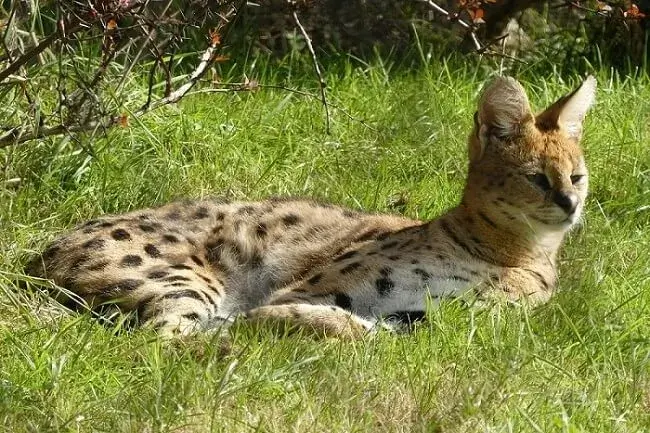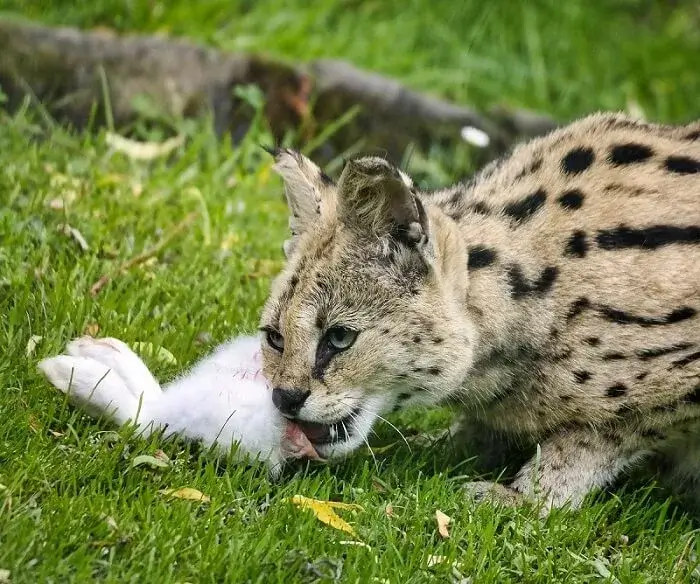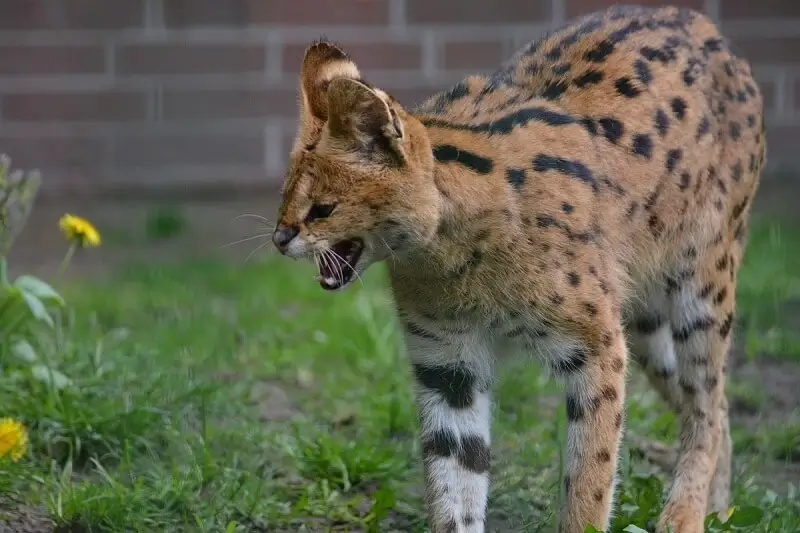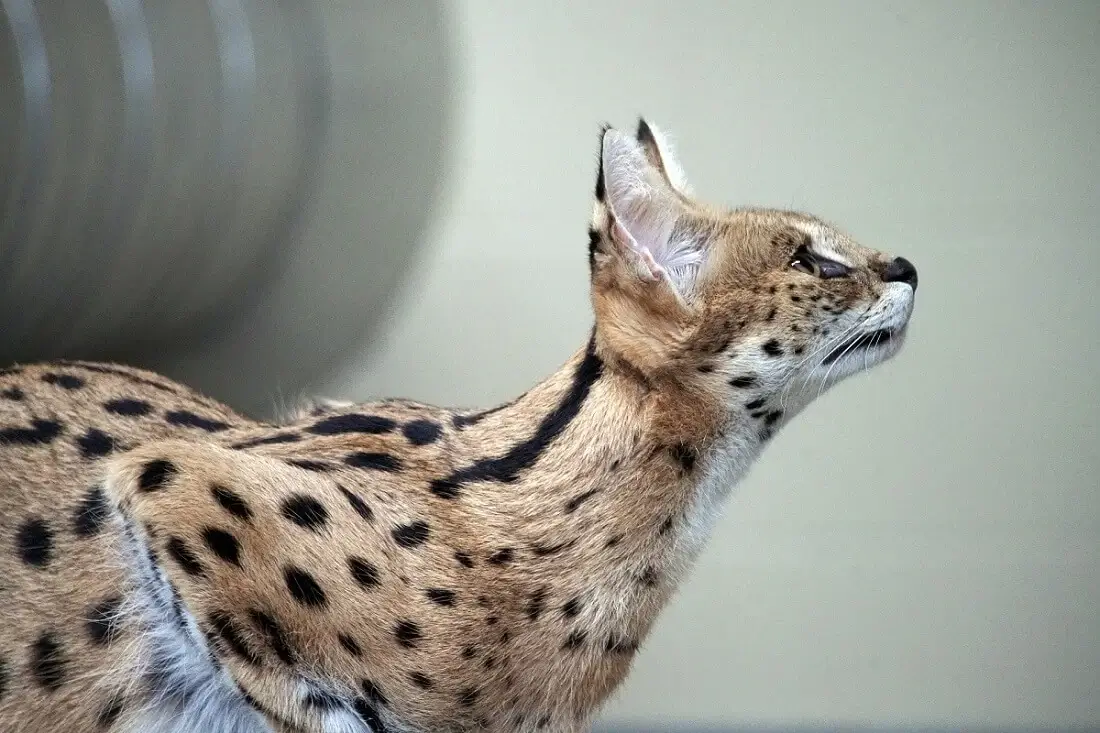As an exotic pet owner, I find Serval cats captivating with their spotted coats and tall ears. These medium-sized African wild cats have rising popularity as unusual pets. To find the answer of “Can a Serval cat kill a Human” I did in-depth research and personal experience. I found that Serval Cats have powerful hunting skills and sharp claws mean Servals can pose a risk to humans if not properly handled.
Although Servals are not as dangerous as lions, tigers, and other big cats, Servals still retain their wild instincts. Therefore, wise precautions need to be taken by anyone considering living with one of these striking cats.
A Closer Look at Serval cat
Servals are native to the savannas and wetlands of sub-Saharan Africa. Weighing up to 40 pounds and standing up to 24 inches at the shoulder, they are significantly larger than a domestic cat. Their tan coats feature dramatic black spots and stripes, while their ears sit tall atop their heads.

Additionally, Servals are agile and lightning fast due to their long legs. Due to these adaptations, they skillfully hunt and kill rodents, birds, frogs, fish, and other small prey even in high grass or along the water’s edge. Although they do not typically attack livestock, Servals can sometimes come into conflict with humans.
Servals Cat Habitat
In the wild, Servals inhabit areas of tall grasses and wetlands across sub-Saharan Africa according to the National Geographic. Their habitats are shrinking as human settlements expand, contributing to dwindling wild populations. They thrive in savannas, marshes, and wetlands where there is plenty of cover for hunting.
Additionally, Servals stake out and defend territories of around 12 square miles for males and 4 square miles for females. Their territories tend to overlap but Servals avoid each other. These solitary cats only come together for mating purposes.
Servals Cat Prey Practice
Within their territories, Servals create paths through the grass and other vegetation. They patrol these paths watching vigilantly for the small rodents, birds, reptiles and other prey they feed on.
Servals are well-camouflaged in the grasses and use their superb hearing to listen for prey movements. Their long legs allow them to make high vertical leaps to pounce and capture animals attempting to flee.
Additionally, Servals are able to survive with less water than other cats by gaining moisture from the prey they consume.

Risk Factors of Servals Ownership
One key risk factor is the serval’s strong prey drive. Their instincts tell them to hunt, even when well-fed. This could lead them to injure or kill smaller household pets. Additionally, their sharp teeth and claws that evolved for catching prey can do damage when swatting or biting, even in play.
Another consideration is potential aggression. Intact male Servals in particular may behave Territorially. They are prone to spraying urine to mark their range. Even female Servals can be somewhat temperamental compared to domestic cats.
Backing up these concerns are reports of serious injuries inflicted by captive Servals. Stories exist of owners and even strangers being attacked and bitten or clawed severely. As in 2019, a toddler was hospitalized after being mauled by a relative’s pet Serval in Florida.
Therefore, Servals need to be dealt with proper training and care. They can be dangerous to humans and can attack them as they have very sharp teeth which can harm humans seriously.
Mitigating the risk of Serval Ownership
Fortunately, there are ways to mitigate the risks of living with a Serval. Some of the key points are given below to mitigate the risk of Serval ownership:
- Acquire as a kitten and socialize it properly.
- Keep gentle, and rewarding interactions with your Servals cat to build trust
- Provide an enriched environment with climbing structures, toys, and activities to prevent boredom and frustration.
- Work closely with an exotic animal veterinarian to keep the Serval physically and emotionally healthy.
- Spay/neuter to reduce territorial spraying and aggression.
- Regularly vaccination is the key to keep the Serval safe against any viral disease.
- Learn Serval communication signals to watch for Overstimulation or aggression.
- Supervise interactions with children/strangers.
- Be prepared to Rehome if challenges arise.
Servals as Pets: A debate
Opinions diverge on whether Servals make reasonable pets. Some associations feel Servals are simply too unpredictable and dangerous in a home environment.
In my opinion, arguments against Servals as pets cite public safety concerns, lack of regulation, and challenges meeting their needs in captivity. However, I believe captive-bred Servals can thrive with proper early socialization, enriched care, and veterinary guidance.
Alternatively, a popular middle ground option is owning a Savannah cat which offer the exotic Serval look with fewer risks. Therefore, it is more suitable as pets. Additionally, since hybrids are legal everywhere, owning a Savannah avoids the complex exotic pet laws that prohibit Serval ownership in some municipalities.
Are Servals Too Dangerous to be Pets?
So, the question which arises very often is “are Servals too dangerous to be pets? The truth is, it depends on the individual circumstances. According to my research and own experience, inexperienced owners underestimate the Serval cat’s wild instincts are likely to face more problems while having Servals as pets.

However, those fully prepared to adapt their home and lifestyle to properly care for a Serval always find the experience uniquely rewarding. Although Servals form strong bonds and can be gentle, but even silly at times. Therefore, in my opinion, the important thing is how you train and treat you Servals results either it dangerous or not.
Conclusion
While not as deadly as larger wild cats, Servals do have the potential to seriously injure humans and other pets if not properly controlled. Their powerful hunting instincts, sharp teeth and claws, and unpredictability, especially intact males, mean even playful swats can do harm.
However, from my personal experience, Servals can potentially inflict injury but responsible ownership is very possible. You must need to thoroughly research your state and local laws before acquiring a Serval as a pet.
Additionally, I always prefer to have a Savannah cat because it poses lower risk as compare to Serval. Ultimately, the decision to own a Serval should not be taken lightly.

